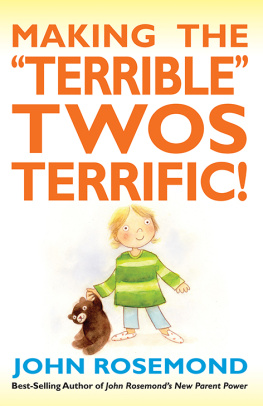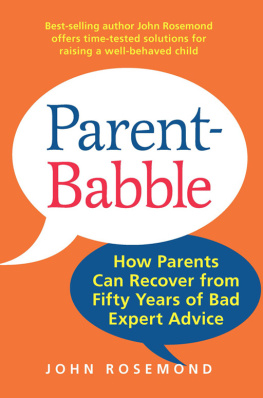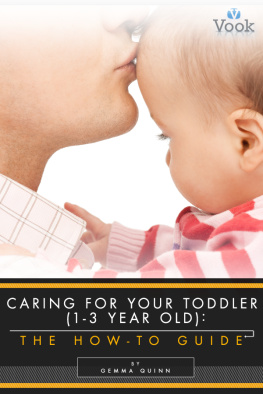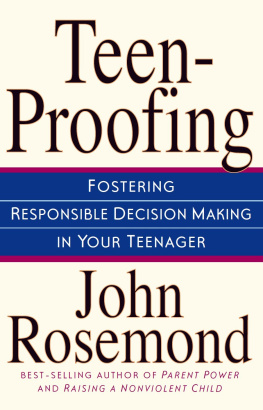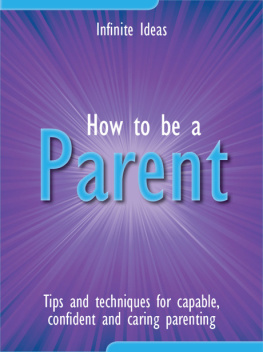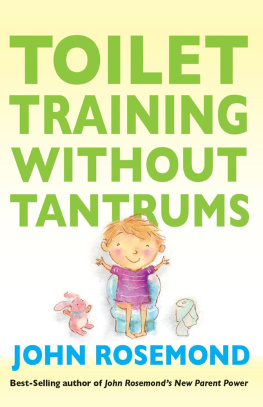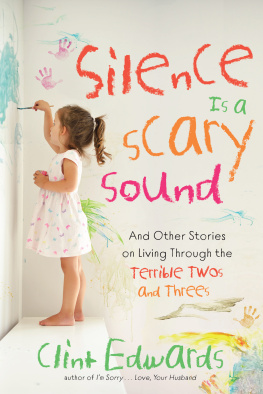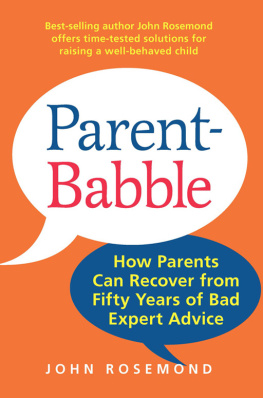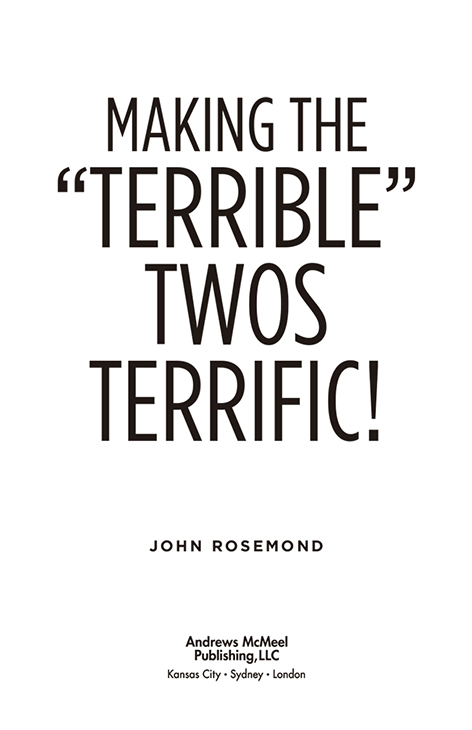The year between a childs second and third birthdays is the hump of parenting. Parents who get over it successfully set positive precedents that ensure smooth sailing from that point on, to the greatest degree possible. That is not to say those parents wont experience future problems. They will, for human beings are the most problematic of domestic species. A high-strung puppy, once properly trained, is never a problem again, but even a very well-trained child is still going to present the occasional difficulty for his or her parents. The difference between the puppy and the child is free will, and free will sometimes leads to perplexing, irritating, and even downright rebellious choices. But parents who have set the right precedents during this critical year will be able to correct these occasional deviations with a proper presentation of love and authority (a major part of which is the ability to remain calm and purposeful in the face of such things).
The third year of life is whenif they are on scheduleparents set about establishing their authority over a child who has been on an all-inclusive entitlement program to that point. It is known as the terrible twos because as parents take on this task, the child pushes back with all of his emotional strength, and as anyone whos been in this particular storm can testify, the emotional strength of a toddler can reach hurricane-like intensity. Understandably, the child does not want the entitlements to end. In fact, he demands that they continue in perpetuity, leading to the toddlers reputation for irrational defiance and out-of-control rages when he doesnt get his way. For two years, he has been led to believe that he is the center of the Universe, the Almighty I Am, and he is not about to relinquish that status without a fight. (Note: The so-called terrible twos can begin as early as eighteen months with some children and can last several months past the third birthday, but the intensity of any childs pushback peaks sometime between birthdays two and three.)
In the face of this tempest, many parents begin stumbling and losing their way. They hesitate, and in hesitating, they lose their authority. In the course of second-guessing themselves, they begin zigging and zagging all over the parenting playing field, trying to figure out how to please their little tyrants. Thats the problem right there: trying to please someone who cannot be satisfied. By definition, tyrants are insatiable. Besides, the last time I checked, its the childs responsibility to please his parents. The parents in question dither, reverse course, give in, blow up, and even give up. In the process of all this zig-zag, they are apt to turn tyrants into full-blown monsters.
Ive had a lot of up-close-and-personal experience with toddlers: two of my own, and then the seven they brought into the world. And Ive had a lot more second-hand experience in the course of counseling parents of toddlers, helping them get through this all-important phase with as few mental scars as possible. Ive put all that experience together in this book. Its designed to serve as a map to guide parents from one side of the minefield to the other. Under the very best circumstances, however, some of the mines will explode. In that event, dust yourself off, collect your wits about you, and keep pushing forward with purpose and as much grace as you can muster.
Keep in mind, always, that youre dealing with a little person who does not know what is in his best interest. He doesnt know what his parents should do; he only knows what he wants them to do, and most of his wanting is not in his best interest at all. Its what you want for himthe quality of his futurethats of the utmost importance.
What should you want for him? Great question. When I am working with parents in a small group, I have each of them write a ten-word or -phrase description of the adult they want their child to be when he or she is thirty years old. Every parent comes up with essentially the same description: responsible, hard working, honest, ethical, compassionate, charitable, modest, and so on. This is a description of the childs character, not achievements. Thats the only proper parenting target, I tell them, and one should begin consciously and purposefully aiming at that target when their child is two. From that point on, every single thing you do should be for the single purpose of advancing your child toward that character-based goal. That single-mindedness keeps a parent moving in a straight line from Point A (the young childs second birthday, when his character education begins in earnest) to Point B (the young adult childs successful emancipation from the home). The lack of that single-mindedness, largely due to a lack of clarity about ones mission, causes zig-zag. When storms arise, that determination will make the difference between weathering them and letting them beat you down.
Even the most single-minded parents will make mistakes. In that regard, here are two things to keep in mind. First, being single-mindedstaying focused on the adult you want your child to be when he or she is thirty years oldwill minimize mistakes and reduce the significance of any one of them. Secondand this is especially the case with a two-year-oldeven your parenting decisions that are not the best possible ones will be better decisions than your child would have made for himself. If you are single-minded, that is.
The secret to transforming the twos from terrible into terrific is understanding the nature and course of the childs development during this critical stage, and that:
- The behaviors typically associated with this transition do not warrant overreaction.
- Your role as parent is to bring about a necessary revolution in your childs way of perceiving and relating to you and the world.
- The typical two-year-old is not inclined to cooperate in this revolution.
- A loving yet firm approach to discipline is the means of negotiating these potentially perilous developmental straits.
- You must discipline yourself in order to be effective at disciplining your child.
- Any parental behavior that is driven by fear or frustration lacks discipline; this is the most precedent-setting time in the parentchild relationship.
- You choose the precedents that are set.
- If you negotiate the challenges of this all-important developmental stage with grace, skill, and confidence, things will never get this tumultuous again.
I wrote this book to help parents understand the nature of the child at this important stage, become and stay single-minded, get over the hump in question, do what is best for their children when their children want what is not best, and set positive parenting precedents in the process. It was my intent to write a book that is low on theory and high on service, one that is, more than anything else, usefullike a road map. My purpose is to help parents have a happy parenthood and raise happy children whose character shines through everything they do. The twos is where it all begins. Its when true parenting starts.

